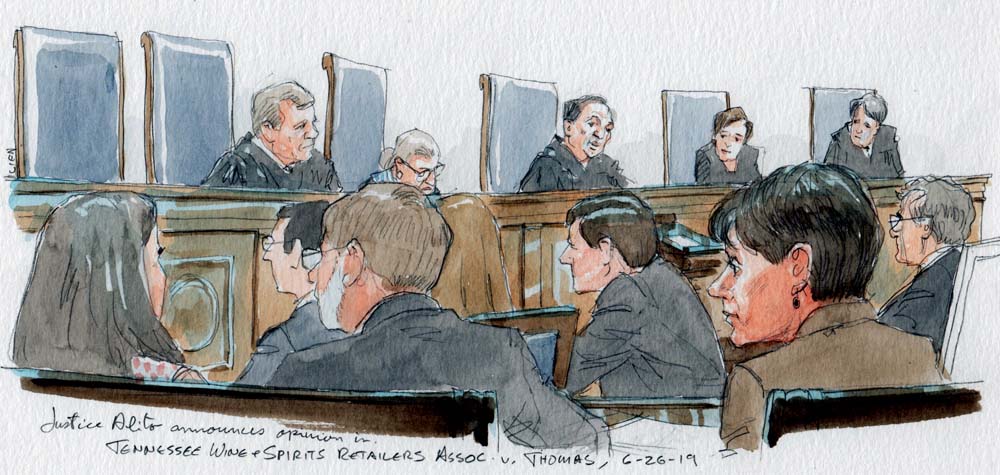Opinion analysis: A total victory for Total Wine in 21st Amendment dispute


Nearly 90 years ago, the 21st Amendment ended Prohibition and gave states broad power to regulate alcoholic beverages. Today, the Supreme Court ruled that the states’ power is not unlimited. By a vote of 7-2, the justices struck down a Tennessee law that requires anyone who wants a retail license to sell alcohol in the state to have lived there for at least two years. The ruling will make it easier for mega-chains like Total Wine, whose application for a license helped to give rise to this case, to expand into states like Tennessee.

The dispute at the center of today’s decision arose when Total Wine, which has nearly 200 stores in 23 states, applied for a license to run a retail store in Nashville. Right around the same time, Doug and Mary Ketchum, who had moved to the state in the hope of finding a better climate for their disabled daughter, applied for a license to run a store in Memphis. The Tennessee Alcoholic Beverage Commission was ready to sign off on both applications, but then the Tennessee Wine and Spirits Retailers Association – a trade association of in-state retailers – intervened, threatening to sue the state if it approved the applications.
That led the TABC to go to court, where it asked a federal judge to rule on whether Tennessee’s residency requirement is constitutional. After the U.S. Court of Appeals for the 6th Circuit struck down the requirement, the retailers asked the Supreme Court to weigh in.
At the Supreme Court, everyone seemed to agree that Tennessee would violate the Constitution if it imposed a similar residency requirement on retailers who wanted to sell something else, such as paint or milk, because it would be discriminating against out-of-state residents. The question before the justices really boiled down to whether the 21st Amendment “saves” laws like Tennessee’s: Today the justices concluded that it does not.
Writing for the court, Justice Samuel Alito explained that the 21st Amendment gives states some leeway to regulate alcohol for legitimate reasons like protecting the public health and safety, but it does not sanction regulations that don’t have any connection to health and safety and are instead intended to shield state residents from competition.
Tennessee’s two-year residency requirement, Alito concluded, “expressly discriminates against nonresidents and has at best a highly attenuated relationship to public health or safety.” The retailers had tried to defend the requirement by arguing that it guaranteed that retailers selling liquor in Tennessee could be sued in state court. But that can easily be achieved some other way, Alito posited – for example, by requiring a retailer who isn’t a state resident to agree to be sued there.
Alito was equally skeptical of some of the other justifications that the retailers cited. For example, he noted, although the retailers suggested that the residency requirement “would promote responsible alcohol consumption,” because a retailer with community ties might “counsel or cut off sales to patrons who are known to be abusing alcohol,” there is no evidence that it actually has that effect. Moreover, Alito added, the retailer is only required to live in the same state – not the same community where he sells liquor – which in Tennessee means that he could live 500 miles away. If the state really wanted to promote responsible alcohol consumption, Alito countered, there are better options that do not discriminate against out-of-state retailers, such as requiring better training for managers and employees. Instead, Alito determined, the primary effect of the residency requirement is to protect the retailers from out-of-state competition, in violation of the Constitution.
Justice Neil Gorsuch dissented, in an opinion that was joined by Justice Clarence Thomas. Gorsuch would have allowed the residency requirement to stay in place, citing “plenty of evidence” that the 21st Amendment was ratified so that the states would be “able to regulate the sale of liquor free of judicial meddling.” And he contended that although a “residency requirement may not be the only way to ensure retailers will be amenable to state regulatory oversight,” “it is surely one reasonable way of accomplishing that admittedly legitimate goal.” Similarly, Gorsuch acknowledged that the residency requirement would reduce “competition in the liquor market by excluding nonresidents or recent arrivals.” “But even that,” Gorsuch suggested, “might serve a legitimate state purpose by increasing the price of alcohol and thus moderating its use, an objective States have always remained free to pursue under the Twenty-First Amendment.”
Although today’s ruling was a victory for Total Wine’s efforts to open new brick-and-mortar stores in states like Tennessee with residency requirements, it could have even broader implications. In his opinion, Alito indicated that the Constitution bars states from discriminating against “all out-of-state economic interests” – not just out-of-state alcohol and alcohol producers, as the retailers had argued. This means that states that allow in-state retailers to ship wine to customers within the state could face an uphill battle in preventing sales from out-of-state retailers as well.
This post was originally published at Howe on the Court.
Posted in Merits Cases
Cases: Tennessee Wine & Spirits Retailers Association v. Thomas
